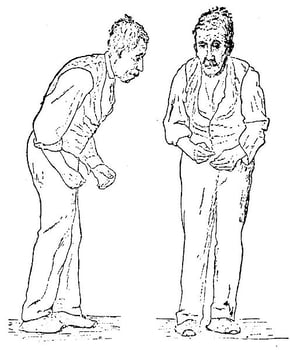
(1886 Sketch of Person with Parkinson's by Sir William Richard Gowers Courtesy of Wikimedia Commons)
Researchers at the University of Alabama, Birmingham have discovered a potential new approach to reducing the damage done by Parkinson's disease. They found that suppressing a key cell-signaling pathway in the brain lessened the destructive inflammation and nerve degradation in the area of the brain affected by Parkinson’s. In the study, rats were used to model the disease by inducing an overexpression of a-synuclein, a protein that is abundant in the human brain. The accumulation of α-synuclein is a core feature of Parkinson’s disease. This accumulation leads to the activation of the brain's immune cells and the production of inflammatory signaling chemicals, which leads to neurodegradation. The rats that were then given a JAK/STAT pathway inhibitors (known as Jakinibs) did not have the immune response, the inflammatory activation, or the neurodegeneration that those that did not receive the inhibitor experienced.
What is Parkinson’s diseases?
Parkinson’s is a chronic neurodegenerative disorder marked by a profound loss of dopamine-producing neurons in the brain. This results in tremors, muscle stiffness, and host of other neurological issues. Currently, there are no treatments available to prevent the disease’s progression.
How would this new treatment help?
With Parkinson’s, chronic inflammation of the brain makes the blood-brain barrier too easily permeable. Immune system T-cells can then infiltrate the brain, increasing the neuroinflammation. This new treatment utilizing Jakinibs successfully inhibited this process. According to an article for UAB news, this study is the first to demonstrate that disrupting the JAK/STAT pathway prevents the neuroinflammation and neurodegregation specific to Parkinson’s. This in turn may be an effective way of slowing the disease’s progression.
“We believe Jakinibs may become a viable therapeutic option for Parkinson’s disease patients,” said Etty “Tika” Benveniste, Ph.D., lead author of the paper published May 4th in The Journal of Neuroscience. “They are already being studied for other conditions, …seem to be well-tolerated, and do not promote troublesome immunosuppression.”
What’s next?
The current study funded by the Michael J. Fox Foundation for Parkinson’s Research and the National Institute of Health, is the first to show that anti-inflammatory therapies have real potential. David Standaert, M.D. Ph.D, professor and chair of the UAB Department of Neurology and a collaborator on the project says, “The next steps will be to validate some of the inflammatory changes seen in the animals in patients with Parkinson’s disease, which in turn will enable planning of clinical studies of anti-inflammatory therapies in patients with Parkinson’s.”
UAB researchers believe a better understanding of how the body’s immune system contributes to the pathology and progression of Parkinson’s will lead to a new class of therapeutic treatment options.
More about Dr. Benveniste and UAB
|
RELATED ARTICLES: NICHD Funds University of Alabama's Zika Virus Study UAB Scientists Uncover TNT in Fight Against TB Test for Parkinson’s on the Horizon Due to Fox-Funded Research at UC San Diego |
Dr. Benveniste is the Senior Associate Dean of Research Administration and Development, Alma B. Maxwell Endowed Chair in Biomedical Research, and the Associate Director for Basic Science Research at the Comprehensive Cancer Center. She is also a professor and chair of the Department of Cell, Developmental and Integrative Biology (CDIB) which is one of seven Joint Health Science departments in the UAB Schools of Medicine and Dentistry. The CDIB has 45 primary faculty, and more than $12.5 million in grant funding.
On Wednesday, November 9th 2016, Biotechnology Calendar Inc. will host the 17th annual BioResearch Product Faire™ at UAB. This gives researchers the opportunity to meet face to face with laboratory equipment suppliers to discuss their needs and see demonstrations of the latest products. Science professionals attend for free. Lab suppliers who wish to take advantage of this opportunity should call (530) 272-6675 or click the link below for more information.




